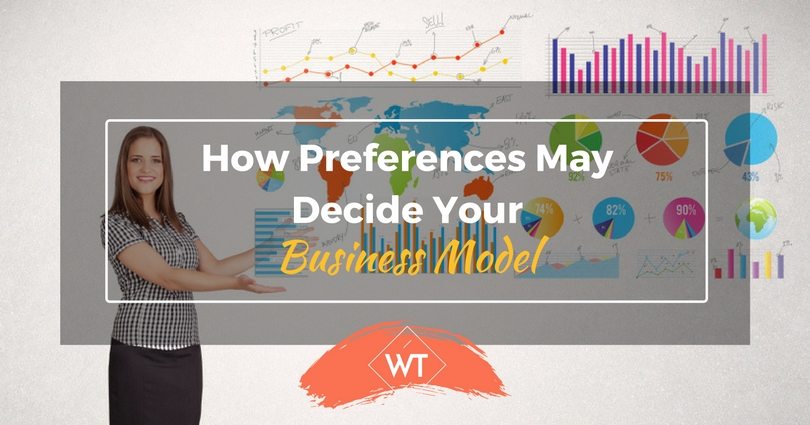How Preferences May Decide Your Business Model


In the world of business there are a lot of “shoulds.”
You should build X kind of business for Y reason.
You should want to build a big company.
You should want to be successful and success should look like mountains of cash.
Should, should and more should.
The reality is that a business owner’s gut and intuition is the most reliable indicator in terms of what is best for them. People can fill your head with “you should do this…,” but only you really know if it works for you and your business model.
One of my primary functions as a business coach is to get business owners comfortable with making their own decisions. Not everyone wants the same things or even wants to run their business the same way. And if you’re not clear on what you do want, you’ll be subjecting to people “shoulding” all over you. That only leads to confusion and unnecessary stress.
So in reality, although some may have the opinion that one business model is better than the other, it really may just depend on your personal preference. Below you’ll find a few of the ways that personal preference plays a role in building your business and choosing your business model.
Not everyone wants a million dollar company
Hitting those seven figures is a common goal among businesses. Here’s the catch though: not everyone wants a million-dollar company and that’s okay! My virtual assistant and I had a conversation about this a few weeks ago.
For her own business, my virtual assistant has started building her staff and rearranging her entire business model based on what a coach had told her (that she could run a boutique virtual assistance firm and have a seven-figure company). This seemed really attractive to her so she dove right in on expanding her team and offering boutique services. However, after a few months she realized she hated it.
She didn’t like managing a huge staff. She didn’t like what it entailed or how it changed her business model. She also realized she didn’t necessarily want a seven-figure business. Consequently she’s reverted back to running her company the way she wants to run it. She’s happier, more efficient and far less stressed.
People work in different ways
One way in which personal preference is evident in choosing a business model is when it comes to how many people you want to provide services for.
I, for example, love to teach in front of groups. I think it’s thrilling and I do some of my best work that way. I also like to create affordable products like books and workbooks so they can reach more people. This means I can focus on a one-to-many business model. I don’t mind doing one-on-one work, I just have way more fun with a one-to-many model.
However, I have a client who is a yoga teacher and she does her best work on a one-on-one basis. While she teaches classes for studios and on a donation basis, what she really enjoys is doing private instruction. As a result, when it comes to her own business she focuses on building her private clientele.
Most people would tell her she should focus on teaching huge groups and creating workshops because it’s more scalable, but what would be the point if she doesn’t do her best work that way? This particular client also considered opening up her own studio and finding a business partner. But after a lot of research and interviewing people who owned yoga studios, she realized she really didn’t want to do that. At the end of the day all she wants to do is teach, not run a yoga studio.
Again, most people would tell her she should open up a yoga studio to make a name for herself and make money. But ultimately it’s not in alignment with her values or her own personal goals, so even if she did pursue it she would not enjoy it.
Not everyone wants to be location independent
In this new world of online business, location independence is all the rage. That means your entire business model runs online and you aren’t bound by where your company is located.
I’m personally on the side of location independence; I pretty much refuse to do in-person meetings. As long as I have the internet, I can run my company. This business model works for me because I work best on my own and I like having the option to travel.
However, not everyone is like me. Some people like to be around others or just know where they are going to be living for the next few years. Some people like having an office to go to in the morning and like interacting with other people while they work.
Conclusion: Determining what business model you actually want
The only way to choose a business model is to choose the one that works best for you. This requires you to take a good look at what you want out of your life. You can answer some the following questions to get on track:
- How do you work best?
- What does an ideal day look like?
- How much flexibility do you want to have?
- Is there any business model you find attractive (i.e. franchising, network marketing, startup)? Why?
This may seem totally unrelated to running a business, but the reality is you must define these things in order to find or create a business model that will work for you and to achieve business success.








Leave a Reply